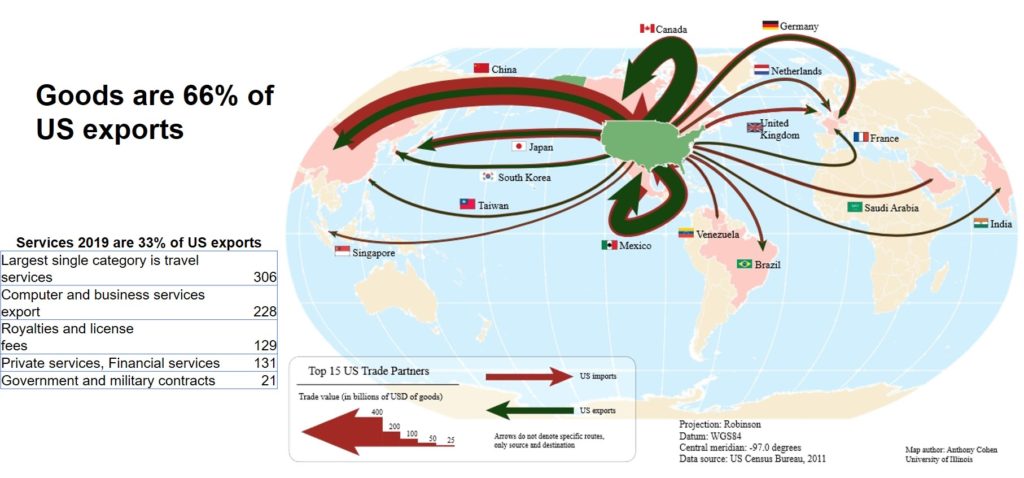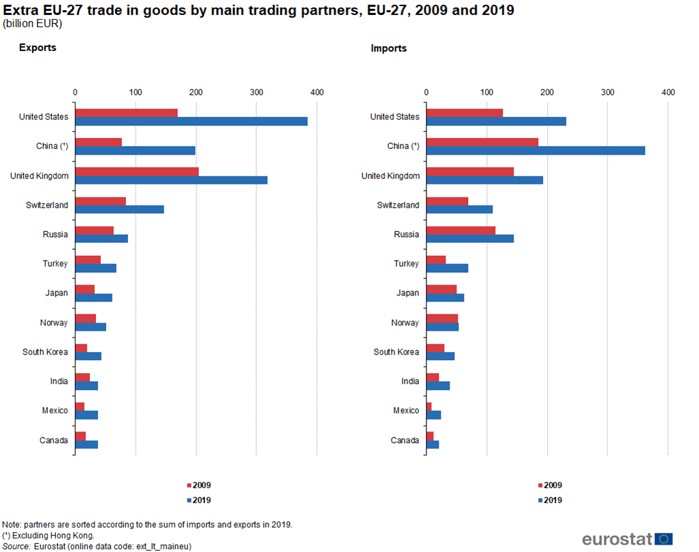Nowadays, geopolitics has given way to geo-economics. Armed conflicts have decreased in number and size, the current weapons are customs duties, financial retaliation and blockades. The objective of geo-economics is to control international or even global areas of activity with the means of significant financial investment and control of economic regulation, while at the same time agitating, in the background, the military threat if a country were to fail to respect its civil commitments.
To play this global game, a country must have a strong economy capable of creating sufficient wealth to attract the capital needed for national and international investment. It is not the search for profit for profit’s sake, but for its ability to attract finance. Such a country can then put pressure on regulatory institutions and impose its point of view on certain issues. This is the case of the United States, which installed this game, 20 years ago, as a strategy to maintain world supremacy in the post-Cold War context.
Europe, for its part, had chosen to work to install global regulation in the face of globalisation, which had become inevitable.This was the birth of the WTO, which was to contain the ambition of the United States and promote harmonious economic convergence.
For the past 20 years, the United States has implemented an economic system that has used China’s development to develop its own economic power. The weapon of competitiveness of American products has remained unsurpassed thanks to the low prices of Chinese products. China, for its part, has taken on this role and fought to keep it. It has relied on the development of East Asian countries as low-cost manufacturing resources.

Initially, the United States also tried to rely on India. However, India was not able to deploy the required industrial and financial infrastructure on the scale of China, which in two decades has achieved a tremendous transformation.
Europe, for its part, has played the Russian card as a counterweight to American power. Russia, a major player in the world energy market, could act on the weak point of the American economy, since its expansion was leading to an increase in energy consumption. The development of oil and shale gas across the Atlantic changed the whole picture.
On the other hand, the internal development of the European Market has not created sufficient growth momentum to rival the American powerhouse. In addition, Europe has also developed trade relations with China, doubling its imports in 10 years, but on a scale insufficient to be a world leader.

This graph also shows the special position of the United Kingdom vis-à-vis the European Union. By leaving Europe through Brexit, it is freeing itself from its restrictive regulations and opening its imports to other markets, at the risk of closing the European market to some of its exports. Among these, financial services are an asset of the geo-economy, if they benefit from fewer constraints, the United Kingdom could become the major hub of International Trade.
In this context, the means of ecological transition to control a race for power based on a race for growth is not necessary for the moment. The dominant blocs, China, the United States and Russia, reject it, while the other countries adopt a wait-and-see attitude.
So what is left for a Europe that seems to have lost at the game of geo-economics? If it is an ageing, low-growth economic power that could become a Western Japan in the not too distant future, does it really need to rely on the youth of Asian countries to survive?
Those who dream of an African springtime that would become the new China of Europe, on a purely demographic argument, should remember India. Africa will certainly develop, but certainly not at the same pace as China.
Europe has definite assets, but it is facing a crest line. It needs to become more integrated in order to strengthen its domestic economy and financial strength and to loosen the grip of globalisation sufficiently to slowly break free from American power. A gradual transfer of part of its exports to the United States and the United Kingdom to its Internal Market would enable it to escape the difficult game of globalisation. Overcoming dependence on oil or gas is also a strategic objective, provided that the new energies can keep pace with development. Finally, if it is to finance research, it must above all adapt its financial system to the development of innovation in order to get out of its technological dependency, particularly with regard to communications and digital technology.
Impossible, you would say. The situation is serious. The current geo-economic game is harmful for Europe. Each passing day is an additional opportunity to predict its breakup in countries that will again become the toy of the dominant powers.
The will arises from the most serious situations. It could be the work of a providential man or woman or a group of men and women. In any case, they will have been set in motion thanks to an inspiring and strong vision of the Future of the World and of Europe itself.
